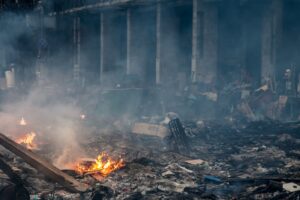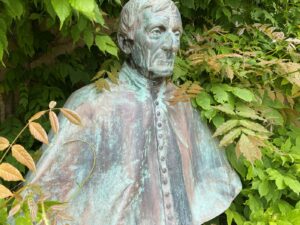Whose problem is fanaticism within a religious faith? Is it only a problem for the fanatics themselves and for the victims of the fanatics’ actions? Is fanaticism essentially irrelevant for non-fanatical co-religionists? Or do those who see through fanaticism and reject it have a particular responsibility as co-believers to try to diminish internal religious and ideological fanaticism? These are among the questions Algerian novelist Boulem Sansal tackles in his gripping novel The German Muhajid.
The German Muhajid centers on Rachel (short for Rachid Helmut) and his younger brother Malrich (Malek Ulrich), both born in Algeria to an Algerian mother and German father. They are raised in Algeria until they are seven and eight, respectively; then their parents send them to France where an aunt and uncle take them in.
Sansal brings the readers through a detailed account of what Rachel discovered as Malrich reads Rachel’s diary, and through Malrich’s response to this in Malrich’s diary. The passages alternate back and forth between the two diaries. What the brothers learn is horror beyond words, though Sansal brilliantly uses words to convey what he can. The book’s translator into English, Frank Wynne, skillfully conveys the sense and thrust of Sansal’s novel across the language barrier.
It opens with Malrich recounting Rachel’s suicide, after which Malrich reads his brother’s diary. In it he learns that their father had been an SS Officer in Nazi Germany. And not just that; their father studied chemistry in Frankfurt, where the Nazis conducted human extermination chemical tests, and then had assignments under Nazi rule at Auschwitz and beyond.
After Rachel discovers his father’s Nazi military records in the home of his dead parents in Algeria, Rachel becomes obsessed with trying to find out what happened. He researches, travels to archives and visits concentration camps. He studies, he learns. Rachel admits he had previously not known what happened in Germany during World War II; he seeks to rectify his ignorance, and grapple with his father’s life-long, continued support for the Nazi movement. Malrich learns of this only upon discovering Rachel’s diary, and then he too confronts his own ignorance about recent history, and about his own father.
Start your day with Public Discourse
Sign up and get our daily essays sent straight to your inbox.Before his brother’s suicide, Malrich’s life held some memories of Algeria, but otherwise it was mostly limited to his ghetto of immigrants in France, “with the dregs of the estate.” He felt unwelcome in France, and after getting expelled from school in his first year of high school, he floated around from odd job to odd job.
During this time, Malrich also floated into the local mosque, where he was initially captivated by the cosmic, or at least rhetorical, grandeur of the Islamists who had been expelled from Algeria and were now in France. For Malrich, however, cracks develop in this Islamist ideology that initially gripped him. He eventually turns his back on the Islamists, thinking he is done with them.
But then Malrich learns what can happen when a hate-based ideology claiming transcendent self-justification sets roots in a population. Upon initially reading Rachel’s diary, Malrich falls into shock. Some days later, however, he comes to the realization:
Where my father and Rachel had failed, I had to try to survive. I felt like this was all too much for me. But I also felt, and I don’t know why, I had to tell the world. I knew it was all ancient history, but still, life doesn’t change and what happened to us could happen again.
Malrich does not think it is sufficient just to proclaim his personal rejection of fanaticism. Instead, he takes action where he can, starting in his own neighborhood, against the creeping reach of the increasingly totalitarian Islamists. He leaves what he calls “dumb apathy” behind.
Malrich begins by trying to awaken his immediate circle of friends to the depth of threat growing right in their own neighborhood where the Islamists are taking over. They discuss launching a “counter-jihad” and other options. He even writes to public officials, bluntly explaining, “Jihadists have taken over our estate and are making our lives hell.” He signs the letter, “A furious citizen notionally under your jurisdiction but forced to live under Islamic law.” But still, even though he knows he needs to do something, he’s not sure what. He finds himself in “a state of permanent panic somewhere between madness, anger, and the urge to rush half way across the world and drown” himself.
Sansal uses crass, blunt language for Malrich’s voice in the novel. Some readers may find this jarring at first, but it proves to be a strength of the novel. Through Malrich’s first-person narrative, Sansal helps the reader see what the discovery of human horror and the awakening of individual conscience look like through the eyes of a male teenager.
The German Mujahid’s quality and urgent relevance also remind us of the need for funding and organizational dedication to make works like this available in translations and multi-media formatting, e.g. audio-books, in languages such as Arabic. The tremendously important role the U.S. government played in fostering movement of strategically important ideas through translation during the Cold War has today nearly evaporated and shows no serious signs of revival, even nine years after 9/11. The need for large-scale re-engagement of such efforts may need to come from the private sector.
Toward the end of the novel, Malrich quotes his aunt’s view that “the difference between yesterday and tomorrow is today, because we don’t know how it will end.” Even when figuring out what action to take is hard, Malrich has at least recognized that today is where opportunity lies, and that today what he as an individual chooses to do, and whether or not he chooses to do anything, matters.









